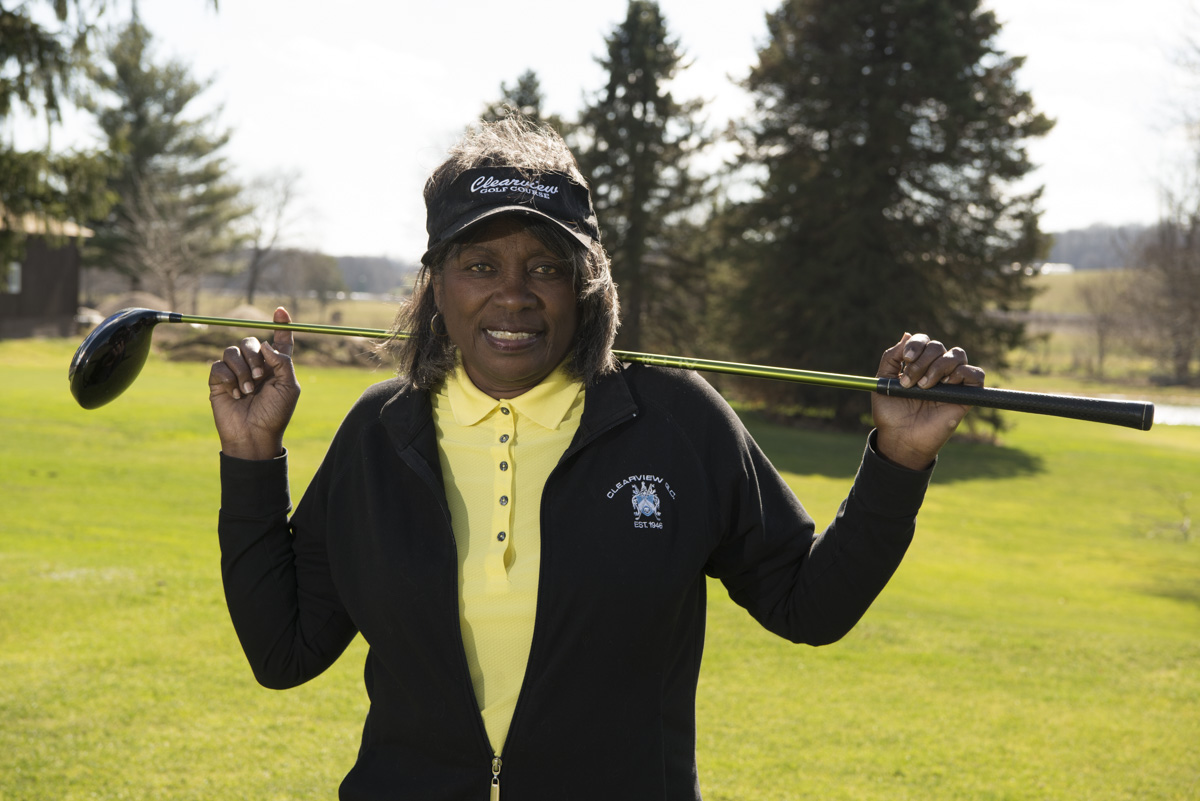70-year-old Ladies Professional Golf Association (LPGA) legend Renee Powell defies expectations. For example, to presume her latest trip to the Bahamas was filled with leisure and relaxation would be a mistake.
In reality, Renee was there on business as a guest of ministry and tourism to help host the fifth annual LPGA Pure Silk Classic. But such events are only the latest chapter in her lifelong golf expedition. In 1967, Renee became the second African-American to compete on the LPGA tour.
Since retiring from professional golf in 1980, Renee’s life has been dedicated to helping others discover the game of golf—just like her father did before her.
Building the Course
Bill Powell opened Clearview Golf Club in 1948, just two years after he returned home from World War II and one year after Jackie Robinson broke Major League Baseball’s color barrier. At the time, Clearview became the first integrated golf course open to all races. Bill Powell holds the distinction of being the first African-American to build, own and operate a professional golf course in the United States. He is remembered as a historic legend in the African-American golf community.
“He grew up 30 years ahead of me,” Renee says. Her father died in 2009 at the age of 93.
“When my father and mother were growing up, there was so much racism,” she says. “Martin Luther King came in the ‘60s and my dad built a golf course in 1948.”
Segregation was the driving force behind Bill’s determination to open a golf course. He fell in love with golf at the age of 9 and was the captain of his high school team in Minerva, about 10 miles east of Canton. But by the time Bill returned to the states after his deployment spent across England and Scotland—which happens to be the birthplace of golf—he found he wasn’t welcomed at golf courses on the soil of the country he just spent years fighting to protect.
Funding the course was another obstacle. First, Bill tried to get a loan from the government, but was rejected. He worked as a custodian at Timken, a bearing and steel company, before becoming the company’s first black security guard. With financial help from two local black physicians and a loan from his brother, Bill bought 78 acres on a dairy farm in East Canton that he would transform into Clearview Golf Club. In 1978, Clearview expanded from nine holes to 18 holes.
“My dad had a real love of getting youth involved in the game,” Renee says. “We happen to be black people, but [Clearview] was not meant to open a black golf course—he despised segregation.”
Battling Prejudice
Despite her father’s trailblazing efforts to integrate the game, Renee still felt the effects of racism throughout her golfing career. She recalls one instance at a hotel while playing at a tournament in Idaho.
“They had my reservation, but when I got there, they saw my face and they didn’t have a room for me,” she says. “Another pro on tour named Kathy Whitworth, the winningest player ever on the LPGA and PGA tour, came in, and she told the desk, ‘We all stay or we all walk.’”
Those effects were also sometimes felt during college at Ohio University, where she spent two years as the captain of the women’s golf team before transferring to Ohio State University in 1964. At OHIO, she was not allowed to travel with the team when it would play in southern states, which ended up playing a role in her decision to transfer schools.
Looking back on it, Renee is still grateful for her time spent at OHIO. She still keeps in touch with her roommates today and, just like every other challenge Renee has been through during her life, she credits those experiences for making her into the strong and successful person she is today.
Renee received golf’s highest honor in 2015 when the Royal and Ancient Golf Club in St. Andrews (Scotland) invited her to become an honorary member, placing her among the first seven female members ever inducted. Founded in 1754, the club is known as the “home of golf” and is one of the oldest golf clubs in the world.
Renee and her brother Lawrence “Larry” Powell, who is the longtime head supervisor of Clearview Golf Club, credit their father for instilling in them the strong work ethic that has never wavered over the many challenges thrown the families way.
“Finding ways to get to the other side, whether you have to go around, through or over the problem. “You just have to get to the other side,” she says.
Renee returned the OHIO campus for the first time since leaving 50 years ago through her connection with Kelly Davidson, an academic advisor within the Patton School of Education at OHIO. Before Davidson accepted her current position at OHIO, she worked in the office of multicultural development at the University of Akron where she first took an interest in Renee’s story.
Clearview Golf Club is just 30 miles from Akron’s campus, and Renee was honored at the school in 2006. The two have remained friends ever since. When Davidson, an OHIO alumna herself, returned as an academic advisor, she knew she had to reach out to Renee to bring her back to Athens.
“I made it my personal mission to keep in touch with her and get her back on campus because I felt it was important for her and her story,” Davidson says. “It was a way for her to evolve. This is where she started, and she’s back again to tell current students her story.”
During her return to Athens, Renee also met with the OHIO women’s golf team. Many players were bought to tears after listening to Renee’s story. Renee and her family have done so much to make golf more accessible for women and people of color that many current Bobcat golfers felt they wouldn’t have their opportunity to play if not for the Powells determination to diversify the game.
“It’s important to me that they know the history of golf and everything Renee has been through,” says Kelly Ovington, OHIO women’s golf coach. “It definitely was not easy for her and I think it opened their eyes to the opportunity they have now.”
Ovington says she hopes to bring the OHIO women’s golf team to Clearview Golf Club in the near future.
Hope for the Future
Renee is leaving a legacy far more significant than tournaments won or lost. In 2011, she founded the Clearview HOPE (Helping Our Patriots Everywhere) foundation at Clearview Golf Club. Her passion for helping veterans comes from her background as the daughter of Bill, who served in the U.S. Air Force during WWII.
Clearview HOPE is a free-of-charge program that allows female veterans, many of whom are battling post-traumatic stress disorder (PTSD), to use golf as a therapeutic remedy. There are currently more than 50 women enrolled in the program.
“It’s been absolutely amazing,” Renee says. “Some [female veterans] hadn’t come out of their house for several years except to go to work. It’s given them courage to go back to school and confidence to get better jobs.”
Preserving the legacy of Clearview is another major aspect of Renee’s life. The Clearview Legacy Foundation is a 501c3 non-profit organization founded in 2001 by the Powell family. The foundation operates off fundraising and donations and welcomes events such as the LPGA Pro-Am, when various LPGA members of past and present come to Clearview for a round of golf and dinner on a Sunday evening. The event is hosted by Pro Football Hall of Fame running back Franco Harris, who was a close friend of Bill’s.
“My dad loved the game of golf and to create an opportunity for all people,” Renee says. Boys and girls, old and young, regardless of race or religion. Here at Clearview it really feels like an extended family when you come here.
SEO
Related posts
What’s Inside
- Behind the Bite (68)
- Features (124)
- In Your Neighborhood (102)
- Photo Essay (4)
- Read the Full Issue (8)
- Talking Points (48)
- The Scene (15)
- Uncategorized (3)
- Web Exclusive (5)
- What's Your Story? (21)


Find us on Social Media